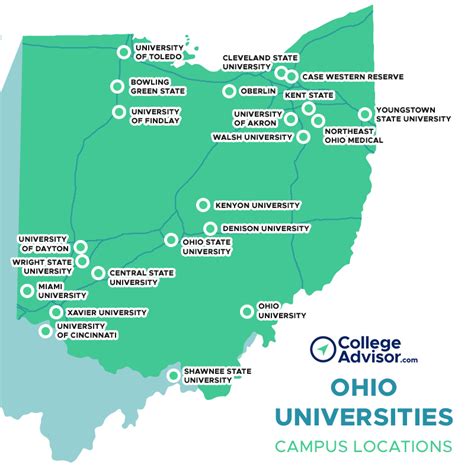Ohio is home to several esteemed research institutions, designated as R1 universities by the Carnegie Classification of Institutions of Higher Education. These universities are recognized for their exceptional research activities and doctoral-level programs. This comprehensive guide will delve into the world-class R1 colleges in Ohio, providing insights into their strengths, offerings, and why they matter.

Ohio’s Academic Powerhouses: A League of R1 Universities
Ohio boasts four R1 universities, each with its unique strengths and contributions to the academic landscape:
- The Ohio State University (Columbus)
- Case Western Reserve University (Cleveland)
- University of Cincinnati (Cincinnati)
- Wright State University (Dayton)
Key Characteristics of R1 Colleges
- Extensive Research Output: R1 universities are prolific in producing groundbreaking research. They account for a significant portion of federally funded research and publish numerous scholarly articles in peer-reviewed journals.
- Doctorate-Granting Institutions: These universities offer a wide range of doctoral programs, enabling students to pursue advanced research degrees and contribute to their field of expertise.
- Faculty Expertise: R1 universities attract top scholars and researchers from around the globe. Their faculty members are recognized for their expertise and contributions to their respective disciplines.
- Cutting-Edge Facilities: R1 universities invest heavily in state-of-the-art research facilities, including laboratories, research centers, and libraries. This allows researchers access to the latest technologies and resources.
Why R1 Colleges Matter
R1 colleges play a pivotal role in:
- Advancing Knowledge: These universities drive innovation and discovery through their research endeavors, contributing to global knowledge and understanding.
- Training the Next Generation of Researchers: Doctoral programs at R1 colleges groom future scholars and researchers, fostering a cycle of academic excellence.
- Economic Impact: R1 universities spur economic development by creating jobs, fostering innovation, and attracting industries that rely on advanced research.
- Community Engagement: R1 colleges engage with their surrounding communities through outreach programs, partnerships, and research collaborations.
Benefits of Attending an R1 College
Students who pursue their studies at R1 colleges benefit from:
- Exceptional Research Opportunities: Hands-on involvement in research projects and access to cutting-edge facilities provide valuable experiences and prepare graduates for research-intensive careers.
- World-Class Faculty: Learning from renowned experts in their fields ensures a rigorous and intellectually stimulating educational journey.
- Strong Career Prospects: R1 colleges offer robust career services and have strong connections with industry leaders, providing graduates with ample job opportunities.
- Global Recognition: The reputation of R1 universities extends beyond state and national boundaries, enhancing graduates’ career prospects on the international stage.
Common Mistakes to Avoid
- Underestimating the Rigor: R1 colleges demand high academic performance and a strong work ethic.
- Neglecting Research Opportunities: R1 colleges provide ample research opportunities. Ignoring these opportunities can limit one’s academic and professional growth.
- Overlooking Career Services: Career services at R1 colleges are invaluable resources for securing internships, jobs, and networking.
- Failing to Engage on Campus: R1 colleges offer a wealth of extracurricular activities and student organizations. Not taking advantage of these can hinder personal and professional development.
Key Statistics on R1 Colleges in Ohio
| University | Total Research Expenditures (2021) | Number of Doctoral Programs |
|---|---|---|
| The Ohio State University | $1.1 billion | 122 |
| Case Western Reserve University | $420 million | 55 |
| University of Cincinnati | $380 million | 71 |
| Wright State University | $112 million | 29 |
Table of Ohio’s R1 Universities
| University | Location | Key Research Areas | Notable Research Centers |
|---|---|---|---|
| The Ohio State University | Columbus | Cancer, Energy, Materials Science | Wexner Medical Center, Center for Automotive Research |
| Case Western Reserve University | Cleveland | Healthcare, Engineering, Social Sciences | University Hospitals Cleveland Medical Center, Case Western Reserve School of Law |
| University of Cincinnati | Cincinnati | Neuroscience, Engineering, Arts & Sciences | Cincinnati Children’s Hospital Medical Center, College of Design, Architecture, Art, and Planning |
| Wright State University | Dayton | Medical Sciences, Engineering, Education | Boonshoft School of Medicine, National Center for Advanced Manufacturing |
Exploring New Applications for R1 Research
Innovative ideas often emerge at the intersection of disparate fields. Consider these creative combinations for potential research applications:
- Multidisciplinary Medicine: Combining medical research with engineering or data science can lead to breakthroughs in personalized medicine and disease diagnostics.
- Sustainable Energy: Integrating materials science with electrical engineering can foster advancements in renewable energy storage and distribution.
- Cybersecurity for Critical Infrastructure: Collaborations between computer science and industrial engineering can strengthen the resilience of essential systems against malicious cyberattacks.
Conclusion
R1 colleges in Ohio are beacons of academic excellence and research innovation. They offer world-class educational experiences, cutting-edge facilities, and unparalleled opportunities for students to engage in groundbreaking research. Understanding the unique strengths and benefits of these institutions will empower students to make informed decisions about their academic future. By embracing the opportunities and avoiding common pitfalls, students can position themselves for success in their chosen fields and contribute to the advancement of knowledge and society at large.
